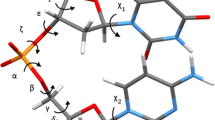Abstract
Forty thermodynamic parameters were estimated for DNA duplexes with a single bulge loop. In DNA computing, sequences need to form wanted structures, not unwanted structures. To achieve this, we should design sequences with low free energy (ΔG 37°) in wanted structures and high free energy in unwanted structures. Conventional sequence design strategies have not prevented the formation of bulge loop structures completely. Estimation of the ΔG 37° of the bulge loop with the loop length from the chemical experimental data has not been enough to predict the ΔG 37° of the bulge loop structure. To investigate the effect of the type of bulged base and its flanking base pairs, we applied the nearest-neighbor model to DNA sequences with a single bulge loop. We also estimated the effect of loop position on the stability of a single bulge loop.
Access this chapter
Tax calculation will be finalised at checkout
Purchases are for personal use only
Preview
Unable to display preview. Download preview PDF.
Similar content being viewed by others
References
Wetmur, J.G.: Physical Chemistry of Nucleic Acid Hybridization, DNA Based Computers III. DIMACS Series in Discrete Mathematics and Theoretical Computer Science, vol. 48, pp. 1–23 (1999)
Gray, D.M., Hung, S.-H., Johnson, K.H.: Absorption and Circular Dichroism Spectroscopy of Nucleic Acid Duplexes and Triplexes. Methods In Enzymology 246, 19–34 (1995)
Xia, T., SantaLucia Jr., J., Burkard, M.E., Kierzek, R., Schroeder, S.J., Jiao, X., Cox, C., Turner, D.H.: Thermodynamic Parameters for an Expanded Nearest-Neighbor Model for Formation of RNA Duplexes with Watson-Crick Base Pairs. Biochemistry 37(42), 14719–14735 (1998)
Allawi, H.T., SantaLucia Jr., J.: Thermodynamics and NMR of Internal G.T Mismatches in DNA. Biochemistry 36, 10581–10594 (1997)
LeBlanc, D.A., Morden, K.M.: Thermodynamic Characterization of Deoxyribooligonucleotide Duplexes Containing Bulges. Biochemistry 30(16), 4042–4047 (1991)
Ohmichi, T., Nakamuta, H., Yasuda, K., Sugimoto, N.: Kinetic Property of Bulged Helix Formation: Analysis of Kinetic Behavior Using Nearest-Neighbor Parameters. J. Am. Chem. Soc. 122(46), 11286–11294 (2000)
Morden, K.M., Gloria Chu, Y., Martin, F.H., Tinoco Jr., I.: Unpaired Cytosine in the Deoxyoligonucleotide Duplex dCA3CA3G·dCT6G Is Outside of the Helix. Biochemistry 22, 5557–5563 (1983)
Papanicolaou, C., Gouy, M., Ninio, J.: An Energy Model That Predicts the Correct Folding of Both the tRNA and the 5S RNA Molecules. Nucleic Acids Research 12(1), 31–44 (1984)
Ke, S.-H., Wartell, R.M.: Influence of Neighboring Base Pairs on the Stability of Single Base Bulges and Base Pairs in a Fragment. Biochemistry 34(14), 4593–4600 (1995)
Zhu, J., Wartell, R.M.: The Effect of Base Sequence on the Stability of RNA and DNA Single Base Bulges. Biochemistry 38(48), 15986–15993 (1999)
Tanaka, F., Kameda, A., Yamamoto, M., Ohuchi, A.: The Effect of the Bulge Loop upon the Hybridization Process in DNA Computing. In: Tyrrell, A.M., Haddow, P.C., Torresen, J. (eds.) ICES 2003. LNCS, vol. 2606, pp. 446–456. Springer, Heidelberg (2003)
Feldkamp, U., Saghafi, S., Banzhaf, W., Rauhe, H.: DNASequenceGenerator: A Program for the Construction of DNA Sequences. In: Preliminary Proc. of Seventh International Meeting on DNA Based Computers, pp. 179–188 (2001)
Kobayashi, S., Kondo, T., Arita, M.: On Template Method for DNA Sequence Design. In: Preliminary Proc. of Eighth International Meeting on DNA Based Computers, pp. 115–124 (2002)
Author information
Authors and Affiliations
Editor information
Editors and Affiliations
Rights and permissions
Copyright information
© 2004 Springer-Verlag Berlin Heidelberg
About this paper
Cite this paper
Tanaka, F., Kameda, A., Yamamoto, M., Ohuchi, A. (2004). Nearest-Neighbor Thermodynamics of DNA Sequences with Single Bulge Loop. In: Chen, J., Reif, J. (eds) DNA Computing. DNA 2003. Lecture Notes in Computer Science, vol 2943. Springer, Berlin, Heidelberg. https://doi.org/10.1007/978-3-540-24628-2_16
Download citation
DOI: https://doi.org/10.1007/978-3-540-24628-2_16
Publisher Name: Springer, Berlin, Heidelberg
Print ISBN: 978-3-540-20930-0
Online ISBN: 978-3-540-24628-2
eBook Packages: Springer Book Archive




